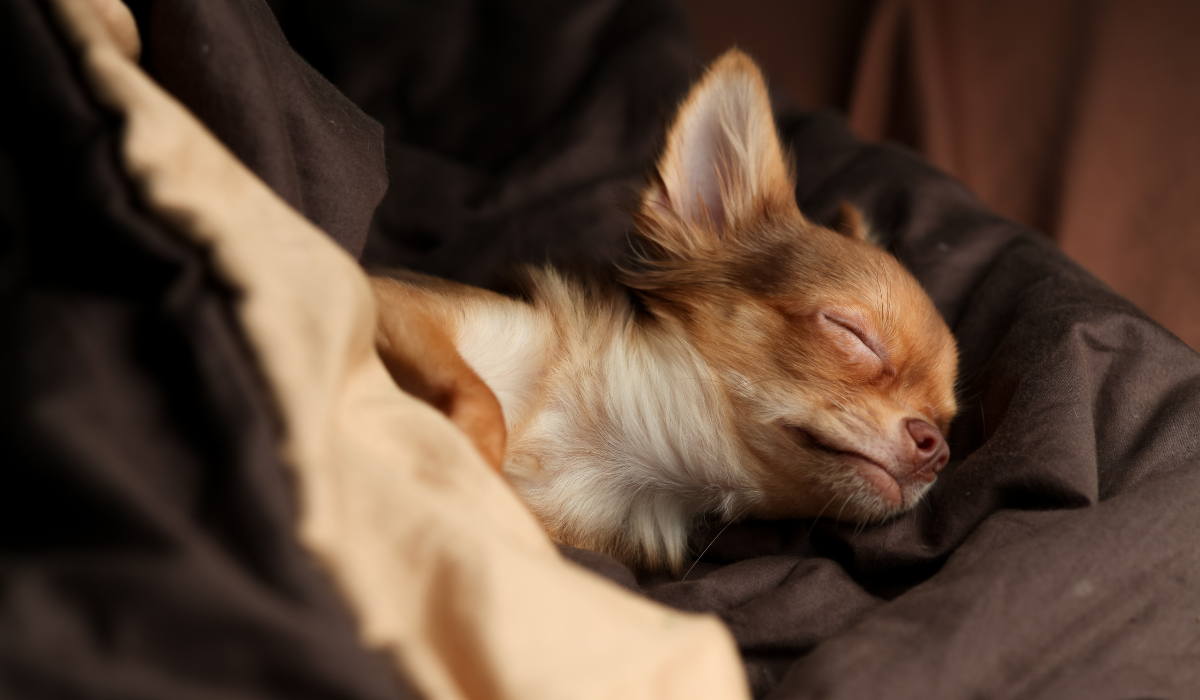Why do Chihuahuas Sleep so Much

Chihuahuas are one of the smallest dog breeds in the world. Despite their small size, they have a big personality, and many owners find themselves fascinated by their sleeping habits. Chihuahuas are known to sleep for extended periods, often up to 14 hours per day. We will explore why chihuahuas sleep so much, the benefits of sleep for chihuahuas, and how to ensure your chihuahua gets the rest they need.
Chihuahuas’ Natural Sleep Habits
Chihuahuas are known for their love of sleep. They are often seen napping in the most unexpected places, such as on laps, couches, or even in their owner’s bed. This love of sleep is not unique to chihuahuas but is a characteristic shared by many dog breeds. Dogs are natural sleepers, and like their wild ancestors, they sleep for extended periods, often to conserve energy and stay alert for potential threats.
As a breed, Chihuahuas have a natural tendency to sleep more than other breeds. It is believed that their small size and high metabolic rate require them to rest more frequently than larger breeds. Additionally, Chihuahuas have a unique circadian rhythm, which means they are naturally more active at night and sleep during the day.
The Benefits of Sleep for Chihuahuas
Like humans, sleep is essential for a chihuahua’s overall health and wellbeing. Sleep provides a range of physical and mental benefits that help chihuahuas stay healthy and happy. Some of the benefits of sleep for chihuahuas include:
• Physical Health
During sleep, the body repairs and regenerates damaged tissues and organs, including the heart, muscles, and immune system. Sleep also helps regulate hormones, including growth hormone, which is essential for bone growth and repair.
• Mental Health
Sleep is vital for mental health, as it helps chihuahuas consolidate memories and process new information. Lack of sleep can lead to irritability, mood swings, and cognitive impairment.
• Energy Conservation
Chihuahuas have a high metabolic rate, which means they burn energy at a faster rate than other breeds. Sleep helps conserve energy and ensure chihuahuas have enough energy to perform their daily activities.
• Relaxation
Sleep is a natural relaxation technique that helps chihuahuas reduce stress and anxiety. It also helps reduce the risk of depression and other mental health conditions.
Sleep and Health Issues
Sleep is essential for overall health, and lack of sleep can have adverse effects on a chihuahua’s health. Chronic sleep deprivation can lead to a range of health issues, including obesity, diabetes, heart disease, and even cancer.
To ensure your chihuahua gets enough sleep, it is important to create a comfortable sleeping environment for them. The ideal sleeping environment for a chihuahua should be quiet, dark, and cool. Chihuahuas are sensitive to noise, and loud noises can disrupt their sleep. Therefore, it is essential to keep their sleeping area away from noise sources such as televisions, radios, and appliances..
Common Sleeping Positions for Chihuahuas
Chihuahuas are known for their unique sleeping positions. Some of the most common sleeping positions for chihuahuas include:
• Curled up in a ball: Chihuahuas often sleep curled up in a ball, with their tail wrapped around their body.
• On their back: Chihuahuas may sleep on their back with their legs in the air, which is a sign of comfort and relaxation.
• Burrowed under blankets: Chihuahuas may burrow under blankets or pillows to create a cozy sleeping spot.
Sleep Routine for Your Chihuahua
Establishing a sleep routine can help ensure your chihuahua gets enough sleep. A sleep routine should include a consistent bedtime and wake-up time. Additionally, it is important to establish a pre-sleep routine that helps your chihuahua wind down and relax. This can include activities such as a bedtime walk, a calming massage, or cuddling with their favorite toy.
Importance of Regular Exercise
Regular exercise is essential for a chihuahua’s overall health and wellbeing, including their sleep. Exercise helps reduce stress and anxiety, which can help chihuahuas sleep better. However, it is important to ensure that your chihuahua gets enough exercise during the day and not too close to bedtime. Vigorous exercise too close to bedtime can lead to overstimulation and disrupt your chihuahua’s sleep.
The Role of Diet in Chihuahuas Sleep
Diet plays an essential role in a chihuahua’s overall health, including their sleep. Feeding your chihuahua a healthy and balanced diet can help ensure they have the energy they need during the day and can sleep better at night. Additionally, it is important to avoid feeding your chihuahua too close to bedtime, as a full stomach can interfere with their sleep.
The Impact of Stress on Chihuahuas Sleep
Stress and anxiety can have a significant impact on a chihuahua’s sleep. Chihuahuas are sensitive to their owner’s emotions and can pick up on stress and anxiety, which can affect their sleep. To help reduce stress and anxiety, it is essential to create a calm and peaceful environment for your chihuahua. Additionally, providing your chihuahua with plenty of love, attention, and affection can help reduce stress and improve their sleep.
Sleep Disorders in Chihuahuas
Sleep disorders are not uncommon in chihuahuas. Some of the most common sleep disorders in chihuahuas include:
• Sleep apnea: a condition where the chihuahua’s breathing is interrupted during sleep.
• Narcolepsy: a condition where the chihuahua falls asleep suddenly and unexpectedly.
• Restless leg syndrome: a condition where the chihuahua’s legs twitch or move involuntarily during sleep.
Conclusion
In conclusion, chihuahuas sleep so much because sleep is essential for their overall health and wellbeing. To ensure your chihuahua gets enough sleep, it is essential to create a comfortable sleeping environment, establish a sleep routine, provide regular exercise and a healthy diet, reduce stress and anxiety, and be aware of any potential sleep disorders.
RECENT ARTICLES
